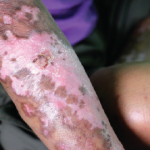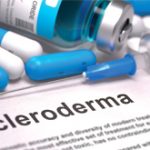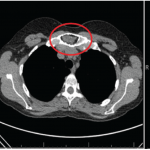Certolizumab pegol has proved safe and effective for treating patients with plaque psoriasis in a Phase 3 clinical trial…


Certolizumab pegol has proved safe and effective for treating patients with plaque psoriasis in a Phase 3 clinical trial…

Recent research examined the relationship between patients with scleroderma who are anti-CTP antibody negative and cancer. Combing two complementary technologies, PhIP-Seq and PLATO-BC, researchers identified the POLR3 complex in cancer-associated scleroderma…

Sara R. Schoenfeld, MD, & Flavia V. Castelino, MD |
Scleroderma, or systemic sclerosis (SSc), is an autoimmune disease characterized by vasculopathy and fibrosis. Although relatively rare, with a prevalence in North America of approximately 300 per 1 million people, SSc is associated with significant morbidity and high rates of mortality.1 Patients with scleroderma have four times greater mortality than age- and sex-matched controls, with…

Kwabna Parker, MBBS, Sireesha Datla, MD, & Nancy Soloman, MD |
We report a case of a 27-year-old woman who was initially diagnosed with systemic lupus erythematosus (SLE), had features of scleroderma and was subsequently found to have lymph node biopsy consistent with multicentric Castleman disease (MCD). She also had serologic evidence of acute Epstein-Barr virus (EBV) infection (vs. reactivation of EBV). The occurrence of MCD…

CHICAGO—Nine out of 10 scleroderma cases include clinical signs of gastrointestinal (GI) involvement, with severe involvement associated with high mortality rates, but the pathology of this is not very well understood, a GI expert said at the ACR’s State-of-the-Art Clinical Symposium. That has left clinicians with a slate of treatments—anti-reflux, antimicrobials and prokinetics—that address only…

A recent study found that mycophenolate mofetil is an effective alternative for the treatment of systemic scleroderma with interstitial lung disease, resulting in possible long-term improvement. According to Aryeh Fischer, MD, this new research points to the future expansion of treatment options…

SAN FRANCISCO—Post-menopausal women with osteoporosis, previously treated with oral bisphosphonates, had greater increases in bone density when taking denosumab compared with zoledronic acid over a year’s time, according to a study presented at the 2015 ACR/ARHP Annual Meeting. The findings were discussed in the Discovery 2015 plenary session, which focused on new research. In the…

Research by Dr. Anthony Rosen, MD, and colleagues found a link between cancer and scleroderma, suggesting the immune system may edit cancer cells. In an interview with The Rheumatologist, Dr. Rosen explores the meaning of this finding and its potential…
David Douglas |
NEW YORK (Reuters Health)—Hidradenitis suppurativa (HS) is associated with a significantly increased risk of adverse cardiovascular (CV) outcomes and all-cause mortality, according to Danish researchers. HS is a chronic, inflammatory skin disease and is most common in women. It is typically diagnosed after long delays, Dr. Alexander Egeberg of the University of Copenhagen and colleagues…

Rajaie Namas, MD, Reshma Khan, MD, & Bernard Rubin, DO |
A 47-year-old Caucasian woman presented to the rheumatology clinic with a one-year history of pain and swelling involving the wrists, hands, ankles and feet that progressively worsened. Her symptoms included generalized fatigue, morning stiffness in the hands and lower back lasting more than an hour, Raynaud’s phenomena (triphasic), photosensitivity, tightening of the skin of the…